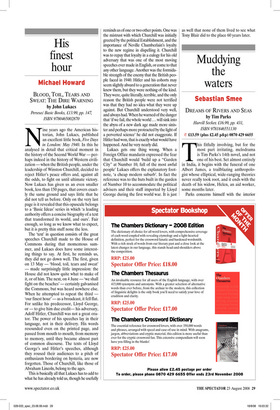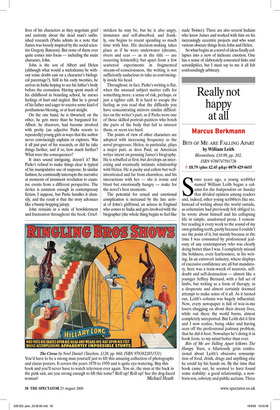Muddying the waters
Sebastian Smee
DREAMS OF RIVERS AND SEAS by Tim Parks Harvill Secker, £16.99, pp. 431, ISBN 9781846551130 ✆ £13.59 (plus £2.45 p&p) 0870 429 6655 This fitfully involving, but for the most part irritating, melodrama is Tim Parks’s 14th novel, and not one of his best. Set almost entirely in India, it begins with the funeral of one Albert James, a trailblazing anthropologist whose elliptical, wide-ranging theories never really took root, and it ends with the death of his widow, Helen, an aid worker, some months later.
40 AM Pg 1
Parks concerns himself with the interior lives of his characters as they negotiate grief and curiosity about the dead man’s unfinished research (Parks admits in a note that James was loosely inspired by the social scientist Gregory Bateson). But none of them ever quite comes into focus — including the main character, John.
John is the son of Albert and Helen (although what would a melodrama be without some doubt cast on a character’s biological parentage?). Still in his early twenties, he arrives in India hoping to see his father’s body before the cremation. Having spent much of his childhood in boarding school, he nurses feelings of hurt and neglect. But he is proud of his father and eager to receive some kind of posthumous blessing, or at least insight.
On the one hand, he is thwarted; on the other, he gets more than he bargained for. Albert, he discovers, had become involved with pretty (an adjective Parks resorts to repeatedly) young girls in ways that the author never convincingly explains or explores. Was it all just part of his research, or did he take things further, and if so, how much further? What were the consequences?
It does sound intriguing, doesn’t it? But Parks’s refusal to make things clear is typical of his manipulative use of suspense. In similar fashion, he continually interrupts the narrative at moments of imminent revelation to examine events from a different perspective. The device is common enough in contemporary fiction, I suppose, but Parks handles it clumsily, and the result is that the story advances like a bunny-hopping jalopy.
John remains in a state of bewilderment and frustration throughout the book. Grief stricken he may be, but he is also angry, immature and self-absorbed, and frankly, one begins to resent spending so much time with him. His decision-making takes place as if he were underwater (dreams, rivers and seas — as in the title — are recurring leitmotifs); but apart from a few scattered experiments in fragmented stream-of-consciousness, the writing is not sufficiently audacious to take us convincingly inside his head.
Throughout, in fact, Parks’s writing is flat, when the unusual subject matter calls for something more: a sense of risk, perhaps, or just a tighter edit. It is hard to escape the feeling as you read that the difficulty you have concentrating mirrors similar difficulties on the writer’s part, as if Parks were one of those skilled portrait-painters who botch the parts of the body that fail to interest them, or seem too hard.
The points of view of other characters are adopted with increasing frequency as the novel progresses. Helen, in particular, plays a major part, as does Paul, an American writer intent on penning James’s biography. He is rebuffed at first, but develops an interesting and eventually intimate relationship with Helen. He is pushy and callow but wellintentioned and far from charmless, and his interactions with her — she is ironic and blunt but emotionally hungry — make for the novel’s best moments.
The potential for sexual and emotional complication is increased by the late arrival of John’s girlfriend, an actress in England who comes to India and gets involved with the biographer (the whole thing begins to feel like nude Twister). There are also several Indians who knew James and worked with him on his increasingly eccentric projects and who want various obscure things from John and Helen.
So what begins as a novel of ideas finally collapses into a stew of inchoate emotion. One has a sense of elaborately concocted links and serendipities, but I must say to me it all felt confoundingly arbitrary.



























































 Previous page
Previous page